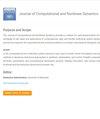几何非线性固有公式中的多体约束
IF 2.1
4区 工程技术
Q3 ENGINEERING, MECHANICAL
引用次数: 0
摘要
几何非线性梁动力学的固有公式为细长的类梁结构提供了紧凑和通用的描述。由于公式中的非线性仅限于二阶耦合,因此在涉及大位移和旋转的气动弹性问题中,建立非线性降阶模型进行动力分析和控制设计是一种有吸引力的选择。由于其无旋转的形式化,其固有公式尚未制定以适应多体约束,限制了其在具有运动约束的多体结构中的应用。这项工作的目的是解决这样的弱点,因为我们提出了在全阶和降阶内在方程中引入多体约束的发展,同时仍然保留了该方法的有益特性。我们使用index-1方法描述了位移级约束的解析,并使用状态投影描述了约束稳定策略对内在公式的适应。利用具有大静态和动态变形的测试用例以及时域模拟来评估全阶和降阶实现的数值行为,以证明该方法的有效性。本文章由计算机程序翻译,如有差异,请以英文原文为准。
Multibody Constraints in the Geometrically-Nonlinear Intrinsic Formulation
Abstract The intrinsic formulation for geometrically-nonlinear beam dynamics provides a compact and versatile description of slender beam-like structures. With nonlinearities limited to second-order couplings in the formulation, it has been an attractive choice in formulating nonlinear reduced-order models for dynamic analysis and control design in aeroelasticity problems involving large displacements and rotations. Owing to its rotation-free formalism, the intrinsic formulation has not been formulated to accommodate multibody constraints, limiting its use against multibody structures with kinematic constraints. This work aims to address such weakness as we present developments in introducing multibody constraints into the full and reduced-order intrinsic equations while still preserving the beneficial traits of the method. We describe the resolution of displacement-level constraints using index-1 approach and adaptation of constraint stabilisation strategies to the intrinsic formulation using state projection. The numerical behaviour of the full- and reduced-order implementations are assessed using test cases with large static and dynamic deformations with time-domain simulations to demonstrate validity of the approach.
求助全文
通过发布文献求助,成功后即可免费获取论文全文。
去求助
来源期刊
CiteScore
4.00
自引率
10.00%
发文量
72
审稿时长
6-12 weeks
期刊介绍:
The purpose of the Journal of Computational and Nonlinear Dynamics is to provide a medium for rapid dissemination of original research results in theoretical as well as applied computational and nonlinear dynamics. The journal serves as a forum for the exchange of new ideas and applications in computational, rigid and flexible multi-body system dynamics and all aspects (analytical, numerical, and experimental) of dynamics associated with nonlinear systems. The broad scope of the journal encompasses all computational and nonlinear problems occurring in aeronautical, biological, electrical, mechanical, physical, and structural systems.

 求助内容:
求助内容: 应助结果提醒方式:
应助结果提醒方式:


